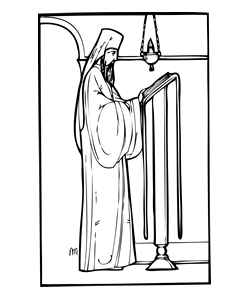|
|||
|---|---|---|---|
| This weekly bulletin insert complements the curriculum published by the Department of Christian Education of the Orthodox Church in America. This and many other Christian Education resources are available at http://dce.oca.org. | |||

Saint Dius was born in fourth-century Antioch to a Christian family. Even in his youth Dius was strongly attracted to the most stringent practices of the faith. He ate little, and sometimes went without any food at all. He prayed constantly, not only for people and situations he knew but for the whole world, and kept silent vigils. These efforts made him spiritually strong, and it was not long before his strength would be tested. While still a young man, Dius heard the command of the Lord to leave his home and go to Constantinople. But his life was not to be in the city; rather he settled in a remote place outside it, in an area so wild that many people would not even go there. Like Saint Anthony and others who served God in isolated places where they did not have the support of other people, Dius was assailed by evil spirits. They showed him hideous phantoms and tried to drive him away from his chosen home. But he was able to fight against them, and before long the thing the spirits feared most came to pass. People heard about this man of prayer, and began to brave the wilderness to seek him. They received spiritual counsel, healing and prayers, and through him many were brought closer to God. The Christian emperor Theodosius the Younger also heard about Dius, and visited him with the Patriarch of Constantinople. They directed that a monastery should be built on the site of Dius' wilderness home, with the emperor providing the funds. Dius was ordained, and during the following years men joined him, the monastery grew, and he served as its abbot. Loved by the monks and revered as a miracle-worker, Saint Dius presided until he was an old man. When he became seriously ill and was presumed to be dying, the other monks surrounded him and began preparing for his funeral service. He suddenly sat up on his sleeping cot and said, "The Lord has granted me fifteen more years of life." He used those years to continue as a healer and helper to the needy and homeless. When he died, he was buried in the monastery he had founded.
Few of us will receive our "marching orders" in such a dramatic way as being called to rise from our death beds to continue our work for a specific number of years. Yet we, too, are given instructions in Psalm 51 (50), well-known because it is part of several worship services. In this psalm we ask the Lord to prepare us to serve Him by teaching, purging, washing, restoring and upholding us. Thus prepared, we will be ready to "march" and do His work: "Then I will teach transgressors thy ways, and sinners will return to thee." In a similar way, we ask Him to open our lips so that our mouths can "show forth thy praise." These familiar verses remind us that we have our orders, and much work to do. |
|||
